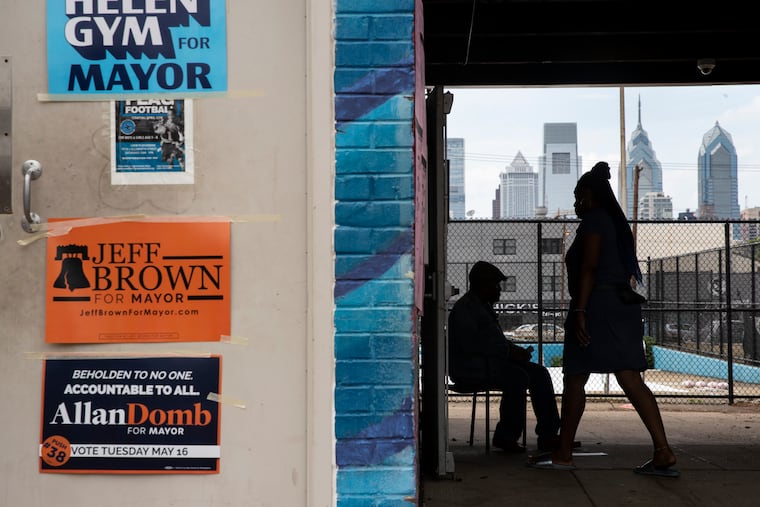How local journalism empowers voters in an age of misinformation and political discord
Voters are heading to the polls at a moment when honest, independent news coverage risks being drowned out by partisan voices that are vastly better funded and not encumbered by facts or the truth.

At the close of the Constitutional Convention of 1787, 81-year-old Benjamin Franklin, who had made his fortune as a printer and newspaper publisher, was asked what form of government had emerged from the proceedings — a republic or a monarchy. “A republic,” he is said to have replied, “if you can keep it.”
In January 2016, another Philadelphia newspaper owner, the late cable television entrepreneur H.F. “Gerry” Lenfest, donated The Philadelphia Inquirer to a newly formed public charity now known as the Lenfest Institute for Journalism, motivated, in part, to help ensure Franklin’s dream.
Lenfest, who died in 2018, was deeply concerned about the future of independent journalism in America in the face of the business headwinds challenging print newspapers in the digital age. He was especially concerned about the future of important public service journalism at the local level, where it is most vital to an informed electorate.
His fear — and his foresight — was that absent the presence of well-funded independent local journalism and trusted news brands, the internet would be flooded with disinformation and political discourse dominated by the wealthy and the self-interested.
Lenfest had in mind days like Tuesday.
Tuesday, of course, is Election Day across the United States, and on this, we seem all to agree. But beyond that, public belief in free and fair elections has polarized radically in just the past two presidential cycles.
First, the very notion of an election “day” seems almost anachronistic. Americans have voted for weeks before today via mail-in ballots and in-person early voting. It can now take days, or longer, to count all the ballots and get definitive election results — a secure process that bad actors can exploit to sow discord.
As Lenfest had foreseen, the level of disinformation and paid political content has grown sharply, both in volume and sophistication. Honest, independent news coverage risks being drowned out by partisan voices that are vastly better funded and not encumbered by facts or the truth.
Thus, we find ourselves in a 2024 election in which Elon Musk, the world’s richest man, has invested well in excess of $100 million to try to reelect former President Donald Trump, a meaningful portion of it in the state of Pennsylvania. This in addition to his $44 billion investment in Twitter (now X), purchased to assert his political views. Had Musk funded Vice President Kamala Harris to advance his self-interest, we would be equally appalled.
Against this backdrop, it is important to recognize, indeed to honor, the local journalists and journalism fighting to inform voters and empowering them to make up their own minds here in Pennsylvania:
The Inquirer has fielded the region’s largest political reporting team, and dedicated nearly its full investigative news team to coverage throughout the campaign.
Every Voice, Every Vote, a coalition of more than 25 Philadelphia media organizations and 50 community groups, has engaged voters with public meetings, church gatherings, news coverage, candidate debates, and public opinion research.
Spotlight PA, a four-year-old statewide news organization serving 105 news organizations across the commonwealth, has produced unparalleled, multilingual voter guides, election resources, and artificial intelligence-assisted tools to answer voter questions 24/7.
The Inquirer’s Opinion desk has published deeply researched endorsements of candidates for the presidency and every statewide office, while other major newspapers have shirked this responsibility. It is gratifying that readers have responded to The Inquirer’s election coverage with record-new digital subscriptions and donations, recognizing the value of this essential work.
All this coverage has one thing in common: It is funded by the nonpartisan, nonprofit Lenfest Institute for Journalism, with support from thousands of other donors large and small, from individual readers to corporate sponsors to philanthropic foundations.
We awake Tuesday with a passionate dedication to free and fair elections and to the fact-based civic information that empowers voters to make informed decisions. This passion is matched by a recognition that freedom isn’t free, indeed that for the challenged business of local journalism, freedom and funding are joined at the hip.
We are blessed to live in a nation founded on the principle of a strong and free press serving to secure a lasting democracy. We love this republic, and we will fight to keep it.
Jim Friedlich is CEO and executive director of the Lenfest Institute for Journalism, the nonprofit organization that owns The Inquirer. @jimfriedlich